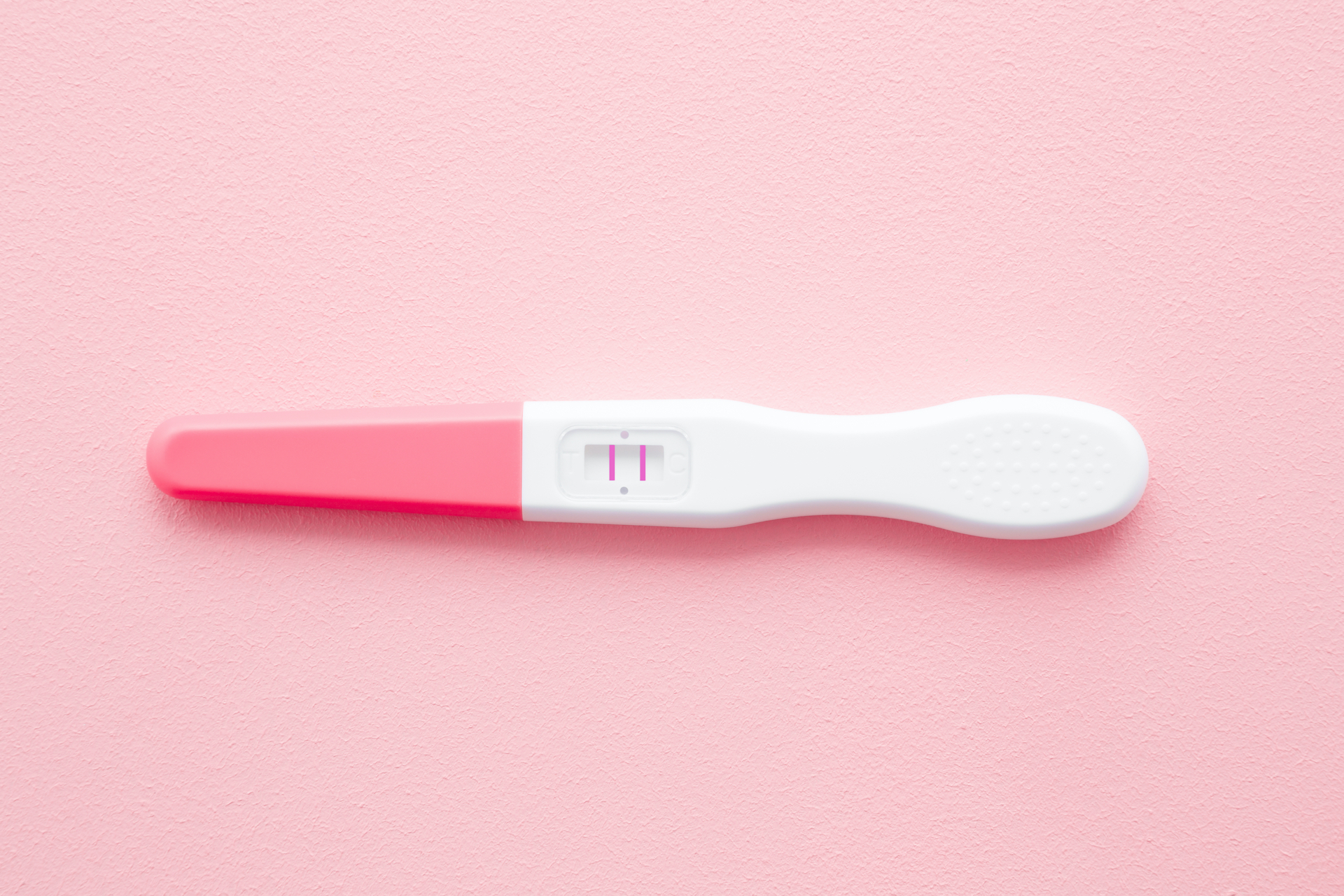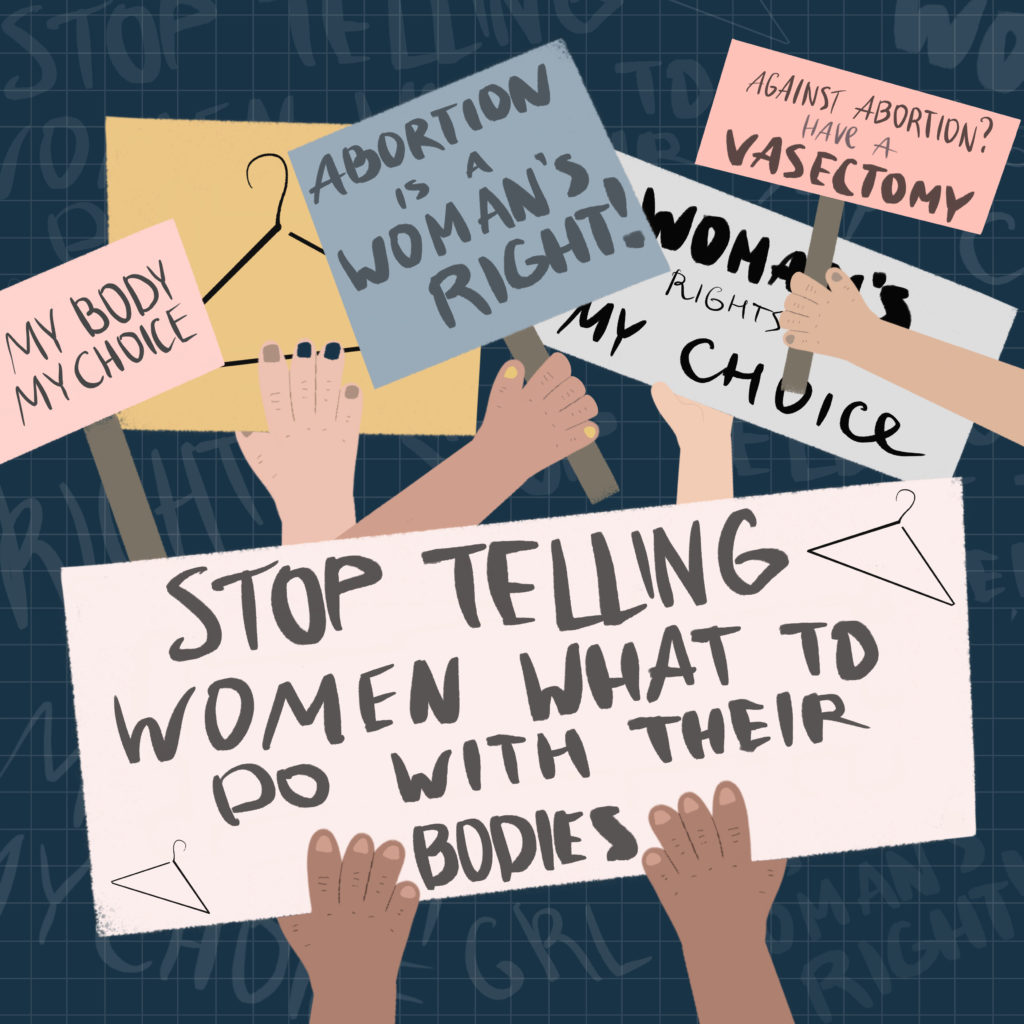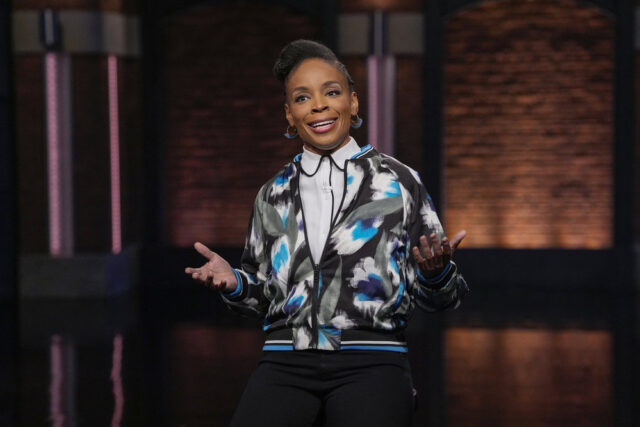Pro-Life Does Not Care About Life
Opinion:
I will begin by responding to an infamous pro-life argument: I do not care if my mother had chosen to get an abortion while pregnant with me.
I am grateful for my life, but I reap many benefits in my situation. My mother wanted to have a kid, my mother’s pregnancy was safe and did not put her life in danger. Women today now have no choice in the matter. With the overturning of Roe v. Wade, women are left to have a child, when they don’t want a child, when the pregnancy is deemed unsafe, and even when it does put the mother’s life in danger. Women are simply left without a choice for their own bodies.
As a baby I was healthy, and I would come into the world healthy. My parents were more than financially ready to have children, support those children, and give us the life that we wanted, the best life we could have. I was raised in a family where my existence stemmed from desire, not force. I was able to be taken care of. Too many of the children brought into the world through forced births will not experience the privileges that I was lucky enough to have.
Pro-life arguments rely on the opinion that every unborn child deserves an opportunity to live, and every unborn child is just as much a life as every person already on this earth. Yet, in a world such as ours, the term “pro-life” is not at all pro-life. Those of us already on this earth are not taken care of.
Pro-lifers, especially those in the government who hold the ability to make changes, do not care about the well-being of life, the quality of life, or life at all. The priority in their argument lies instead in two things; the desire to control and strip others of bodily autonomy, and enforcing the lifestyle of religious extremists upon a country of “religious freedom.”
“This is not about controlling women.”
Now more than ever, there is growing recognition of the fact that not everyone who can get pregnant identifies as a woman. In the fight for the right to reproductive healthcare, we must include these people in our conversations. That being said, pro-life ideas stem from the long-lasting oppression of women in a patriarchal society.
If You’re a Cisgender Man…
Can you name one law that has been considered and/or passed that regulates your body? Can you name one law that restricts the rights you have to your own body? Can you name one law that places control over your body into the hands of others?
Contradictory Expectations for Men Versus Women
The pro-life argument believes that women should not have the right to abortion and also aims to limit access to contraceptives. In cases of sexual assault, women are constantly blamed for having done something “wrong” to cause a man to assault them. Here, the perpetrators are rarely blamed for their violence, and the victims are guilted into believing they were the reason for being harmed.
Several pro-lifers claim to only support abortion in extreme cases. This mindset is extremely harmful, as it reinforces the longstanding idea that in order for a woman to have a say over her body and her being, someone else has to violate it first. On the other hand, there is never any mention from pro-lifers about men having to regulate their bodies. This further proves the fact that the fight against abortion (and contraceptive) access has the end goal of controlling women, not of “protecting life.”
If controlling the causes of pregnancy is about the children and not about oppressing women, men would be told to get vasectomies, right? They are reversible, they are effective, and they are no more harmful than any other means of birth control. But no one tells men to do this, because the pro-life group does not care what men do.
Many men brag about their body counts. For them, it’s a “who can get more women” competition. For women, these same men expect it to be as low as possible. The men can be with anyone, but the women they are with should only be reserved for them. “High” body counts for women lead to slut-shaming, and for men, they lead to idolization.
Ask yourself why men are never scrutinized for their actions that lead to pregnancies, and why all the fault lies on women?
“If you don’t want to get pregnant, don’t have sex.”
I think this is one of the worst arguments I hear from the pro-life side. First off, it is typically aimed at women regardless of the fact that a man has just as much a part in sexual encounters that lead to pregnancy. I already went through the contradictory expectations between men and women, so it’s no surprise that this is a harmful double standard.
I could explain why this logic doesn’t stand well, but I’ll just give you some other life scenarios that use the same logic, and you can see for yourself whether you would follow these rules.
- If you don’t want to get into a car accident, then don’t drive.
- If you don’t want to choke on food, then don’t eat.
- If you don’t want to get your wallet stolen, then don’t have a wallet.
- If you don’t want to get caught in a fire, then don’t have a stove.
- If you don’t want to break a bone, then don’t move.
All of these scenarios are possible negative outcomes of everyday actions. Everything that we do holds risks, and that is simply the way that the world works. If we take no risks, our world cannot exist. Pregnancy is another one of these risks that are taken on when engaging in a completely natural, human activity. It is only viewed differently because a stigma has been built around sex throughout the years, making it seem like a shameful act when it is actually one of the most natural things we do.
“We need to follow the word of God.”
I don’t care what your God says.
Many pro-life arguments are rooted in an interpretation of Christianity. For these people, abortion goes against their values, their book, and their God. For them, life begins at conception, and abortion is murder. But this is a single interpretation of Christianity. Why should that get to dictate the way that an entire country of so-called “religious freedom” lives?
I’m a Jewish woman. My religion believes that life does not begin until birth. My religion requires abortions when the child-bearers health is at risk. Further, health risks are not only defined as physical but as mental/emotional risks as well. The overturning of Roe v. Wade infringes upon my religious freedom, along with other Jewish folks in the country.
It must also be acknowledged there are many Christians who believe in giving people the right to make choices about their own bodies. There are also countless followers of unmentioned religions that are pro-choice.
Restricting abortion (and contraceptive) access is not religious freedom. It’s as simple as that. This decision is, in fact, the opposite — it is a pathway to creating a country ruled by religious extremists and their beliefs. So, if you think Roe v. Wade is unconstitutional, your actions and/or support to overturn it are as well. Do not force your religion into my life.
“I care about the children.”
No, you don’t. And here’s why: the pro-life political stance is on the right-wing side of the political spectrum. Your other political values and motives do not align with the protection and nurturing of life.
If you truly care about the life of the child…
You will support the enforcement of stricter gun laws.
You will do something about the constant school shootings (and out-of-school mass shootings) across the country. You will care about protecting the lives of the children already here, but you don’t. Instead, you focus your time on fighting for hypothetical children that don’t yet exist, rather than the ones who have already lost their lives in the time that you have ignored them.
You will support laws that ensure financial stability for everyone, new parents included.
Rather than leaving new families impoverished and unable to care for their kids, you will help in movements to make financial stability universally accessible. While fighting so adamantly for the children that aren’t even born yet, you are not doing anything to help the kids, families, and people around the country.
What are you doing about those starving, those in need of stable housing, or those in need of basic necessities? Do you want to provide these people with things like healthcare and good education, or do you want them and the children you force them to have to live lives of struggle? Furthermore, many of these people in poverty that you want to force kids upon cannot afford to provide their children with good quality lives.
You will not want to bring unwanted children into the world.
Someone’s reasoning for wanting an abortion does not need to be an extreme case scenario. Sometimes people simply do not want a child, and that is just as valid a reason as any. When you force people who don’t want children to have them anyways, the kids grow up in homes where they feel neglected. They always know that they were unwanted. What good do you truly think that brings into the world?
Well, those unwanted kids can always be put up for adoption or placed in foster care, right?
If this has ever been an argument of yours, ask yourself two questions.
- What have I done to help improve the adoption and foster care systems?
- How many kids have I fostered and/or adopted?
If your answers to question #1 are “No”, and question #2, “None,” then scratch this point from your pro-life argument completely. It is widely known by those uninvolved in these systems, and the parents and children within these systems, that children put up for adoption or placed into the foster system too often experience a severe amount of trauma.
You will not let people die so that an unborn fetus can live.
It’s general knowledge that birth can cause a multitude of complications and, in some cases, be fatal. In taking away the right to abortion access, child-bearers will be forced to go through with unsafe pregnancies that their bodies cannot handle. In the cases that lead to death, you are choosing the life of an unborn fetus over the life of someone already on this earth. In turn, you may also be choosing to risk the life of someone that already has children, ultimately leaving those kids without a parent. I’m sure you can guess the negative effects that this outcome will have on a number of families.
These are only some of the reasons that claims to care about the children are false. All of the aforementioned issues (and more) are affecting the people around this country every day, and nothing is being done to solve them. You cannot say that you value protecting life when most, if not all, other aspects of this political mindset work to do the opposite.
“Old enough to bleed, old enough to breed.”
Pro-lifers are quick to say that because abortion is murder, people with a uterus hold responsibility for ensuring that they do not get pregnant. Yet these are the same people who refuse proper sex education because they deem it inappropriate.
If those in school are too young to be learning about (safe) sex, what makes you think they are old enough to raise a child? What makes you think they have the knowledge and experience to properly raise a child if they don’t have the knowledge and experience to understand how that child was brought into the world? Trust me, if you saw who I was at eleven-years-old, you would not want me to be forced to birth and raise a child.
Claims of Hypocrisy
In this regard, I have no first-hand experiences to rely on. However, I have been seeing people speak about the hypocrisy of pro-lifers, in that they will sometimes go against their word for themselves only. This falls in line with the general notion that some people do not care about an issue until and/or unless it affects them directly. I cannot confirm nor deny the validity of the stories told in the following tweets, but they are only a few examples of the stories I have heard like this. Personally, I don’t think so many of these stories would be told without any truth to them.
I grew up in the rural South. I know A LOT of white evangelical anti-choice women who’ve had abortions. And every single one of those women told me their abortions “didn’t count.”
— Leah Hampton (@pludger) June 26, 2022
My ex performed abortions. She said the amount of people protesting who’d later ask to sneak their daughters in the back for a procedure and who’d be back at it the next day were predictably common
— Matt (@NegativeYoda) June 26, 2022
My aunt was a clinic protestor for years. She drove her daughter hours to another clinic where she wouldn’t be recognized. Went back to protesting a few days later.
— MokeyFraggle (@FraggleMokey) June 27, 2022
I’ll tell my story again, attending a pro-choice rally in college, one woman discussed volunteering at local clinic, and who walks in but the president of the high school pro-life group! “It’s different when it’s you,” she explained.
— Mask Wearing Amy 🌻 (@amyriscool) June 27, 2022
The Separation of Parties Since Roe v. Wade Has Been Overturned
In the days since the U.S. Supreme Court officially overturned Roe v. Wade, I have come across multiple people who are otherwise conservative and do not agree with the court’s decision. This overturning is extremist and rejects any sense of societal evolution into the modern day.
I have never seen more people from different parts of the political spectrum come together and agree so effortlessly. This issue is not one of the country’s political parties, it is one of the masses versus the controlling few.
Pro-lifers, especially those of you in the government: the majority does not agree with you. You are turning your own party against you. You are disappointing an entire nation. Is this what your staunch patriotism is all about?
Inclusivity
When speaking about the overturning of Roe v. Wade, and about reproductive rights and rights to bodily autonomy, it is vital that we make our conversations inclusive. The different ways that these changes will affect people of different groups. Finances, race, gender identity, and sexual orientation are some (not all) of the factors that play into the intersections of the government and the people.
Using Inclusive Language in Abortion Care is Essential
An Inclusive Approach to LGBTQ+ Abortion Rights
The Devastating Economic Impacts of an Abortion Ban
Resources
National Network of Abortion Funds
How to Help Abortion Seekers In Trigger Law States Right Now
This piece speaks about the importance of donating to local abortion funds, and how doing so is more impactful in reaching those in need.
This page will lead you to multiple resources for an array of issues relating to abortion access, highlighting the importance of BIPOC, LGBTQ, and body inclusivity.

Writer | Tweet me @rachelnazar






